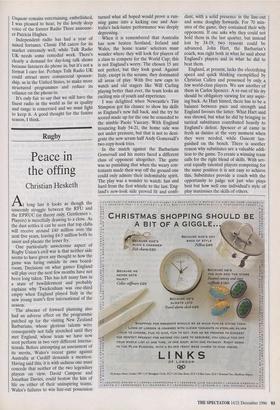Rugby
Peace in the offing
Christian Hesketh
Along last it looks as though the unseemly struggle between the RFU and the EPRUC (in theory only, Gentlemen v. Players) is mercifully drawing to a close. As the dust settles it can be seen that top clubs will receive around £40 million over the next five years, leaving f4-5 million both to assist and placate the lesser fry. One particularly unwelcome aspect of Rugby Union's civil war is that neither side seems to have given any thought to how the game was faring outside its own board- room. Decisions on what games England will play over the next few months have not been long taken. This has left many fans in a state of bewilderment and probably explains why Twickenham was one-third empty when England played Italy in the new young team's first international of the season.
The absence of forward planning also had an adverse effect on the programme patched up for the visiting New Zealand Barbarians, whose glorious talents were consequently not fully stretched until they met England, whose team we have now seen perform in two very different interna- tionals. Before attempting an assessment of its merits, Wales's recent game against Australia at Cardiff demands a mention. Having said this, it is with sadness one must concede that neither of the two legendary players on view, David Campese and Jonathan Davies, could bestow the kiss of life on either of their uninspiring teams. Wales's failures to win line-out possession turned what all hoped would prove a run- ning game into a kicking one and Aus- tralia's lack-lustre performance was deeply depressing.
When it is remembered that Australia has now beaten Scotland, Ireland and Wales, the home teams' selectors must wonder where they will look for players of a class to compete for the World Cup; this is not England's worry. The chosen 15 are not perfect, but they look good. Against Italy, except in the scrums, they dominated all areas of play. With five new caps to watch and old stagers like Will Carling playing better than ever, the team looks an exciting mix of youth and experience.
I was delighted when Newcastle's Tim Stimpson got his chance to show his skills as England's new full back, and the try he scored made up for the one he conceded to the nimble Paolo Vaccary. With England trouncing Italy 54-21, the home side was not under pressure, but that is not to deni- grate the new scrum half Andy Gomersall's two copy-book tries.
In the match against the Barbarians Gomersall and his mates faced a different class of opponent altogether. The game was so punishing that when the weary con- testants made their way off the ground one could only admire their indomitable spirit. The play was a wonder to watch: fast and hard from the first whistle to the last. Eng- land's new-look side proved fit and confi- dant, with a solid presence in the line-out and some doughty forwards. For 70 min- utes of the game, they contained their wily opponents. If one asks why they could not hold them in the last quarter, but instead lost by 34-19, two reasons could be advanced. John Hart, the Barbarian's coach, was right both in what he said about England's players and in what he did to beat them.
England, at present, lacks the electrifying speed and quick thinking exemplified by Christian Cullen and possessed by only a few world-class players. We saw another of them in Carlos Spencer. A re-run of his try should be obligatory viewing for any aspir- ing back. As Hart hinted, there has to be a balance between pace and strength and England favours the latter. What Hart said was shrewd, but what he did by bringing in tactical substitutes contributed heavily to England's defeat. Spencer et al came in fresh as daisies at the very moment when they were needed, while Guscott lan- guished on the bench. There is another reason why substitutes are a valuable addi- tion to the game. To create a winning team calls for the right blend of skills. With sev- eral equally talented players competing for the same position it is not easy to achieve this. Substitutes provide a coach with the opportunity to judge not just who plays best but how well one individual's style of play maximises the skills of others.


















































































































 Previous page
Previous page